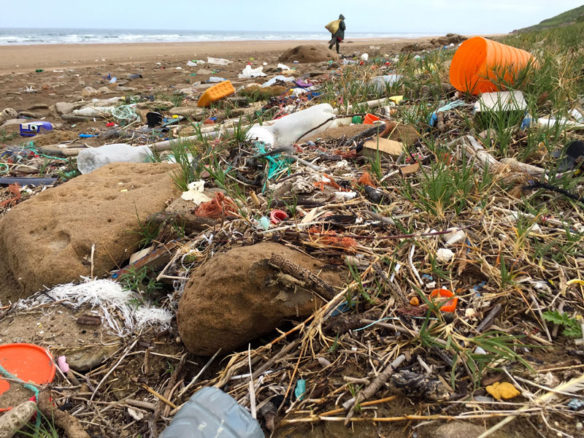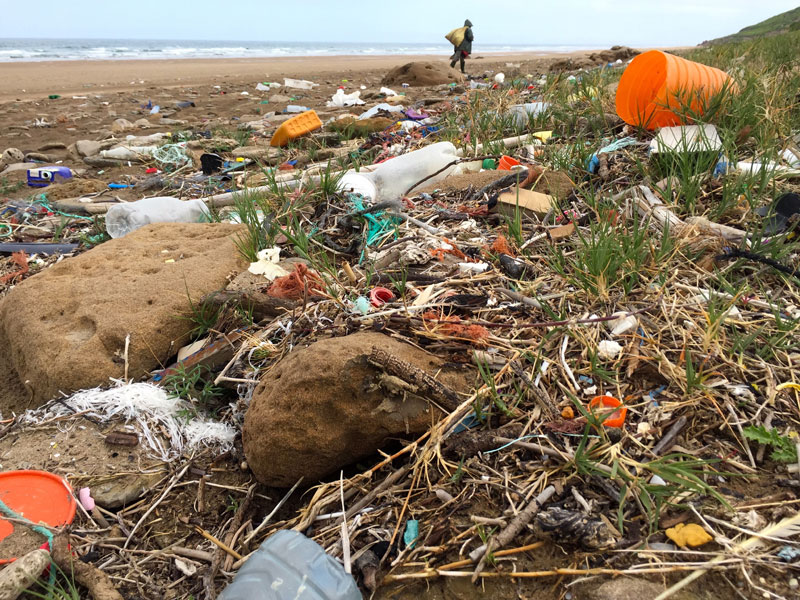
“The unprecedented plastic waste tide plaguing our oceans and shores, can become as limited as our chosen relationship with plastics, which involves a dramatic behavioral change on our part…”
Captions and Photo: © SAF — Coastal Care
Excerpts;
The Ocean Atlas published by the German Heinrich Boll Foundation, an independent international green think tank for policy reform and the University of Kiel’s Future Ocean Cluster of Excellence, lists the top 20 nations with the worst plastic waste mismanagement around the world.
China, Indonesia, Philippines, Sri Lanka, Egypt, South Africa, Nigeria, Morocco, Thailand, Malaysia, Vietnam, Algeria, Turkey, India, Brazil, Pakistan, North Korea, United States, Myanmar and Bangladesh, are responsible for 83 percent of global plastic waste mismanagement. The Ocean Atlas says 80 percent of plastic waste in the oceans comes from dry land, mainly from countries with no or poor waste management…
Read Full Article, IPS News (11-28-2018)
Top 20 Countries Ranked by Mass of Mismanaged Plastic Waste, Earth Day (04-06-2018)
We made plastic. We depend on it. Now we’re drowning in it; The National Geographic (11-07-2018)
More than 8. 3 billion tons of plastics made: Most has now been discarded; Science Daily (07-19-2017)
Humans have created 8.3 billion metric tons of plastics since large-scale production of the synthetic materials began in the early 1950s, and most of it now resides in landfills or the natural environment, according to a study.
These 10 companies are flooding the planet with throwaway plastic; Greenpeace (10-09-2018)
Nine months, six continents, 239 cleanup events, and more than 187,000 pieces of trash later, we now have the most comprehensive snapshot to date of how corporations are contributing to the global plastic pollution problem…
Plastic pollution: When The Mermaids Cry: The Great Plastic Tide, Coastal Care – ©2009
” Plastic is versatile, lightweight, flexible, moisture resistant, strong, and relatively inexpensive. Those are the attractive qualities that lead us, around the world, to such a voracious appetite and over-consumption of plastic goods. However, durable and very slow to degrade, plastic materials that are used in the production of so many products all, ultimately, become waste with staying power. Our tremendous attraction to plastic, coupled with an undeniable behavioral propensity of increasingly over-consuming, discarding, littering and thus polluting, has become a combination of lethal nature…
The unprecedented plastic waste tide plaguing our oceans and shores, can become as limited as our chosen relationship with plastics, which involves a dramatic behavioral change on our part…”
You Can Help Turn the Tide on Plastic. Here’s How; The National Geographic (05-26-2018)
Do these six pain-free things, and you’ll help reduce the impact plastic is having on oceans and other waterways around the world…
Homeless man cleans up beaches every day, Cape Town; Metro (03-15-2016)
The man is called Dan. He’s 28 and homeless, and he grew up on the Eastern Cape. Every day, he cleans the beaches for no other reason than to ‘make the place nice’ because he’s ’embarrassed about the pollution…’
A running list of action on plastic pollution; National Geographic (10-29-2018)









